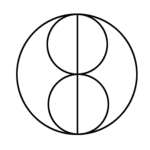What is mind? No matter!
What is matter? Never mind!
Professor Ashok Sharma feels that science fails to understand consciousness as an independent entity. He says, “Science cannot integrate a non-physical entity, like consciousness, into its conceptual framework, and views human personality as a non-conscious physical system.” Consciousness, according to Prof Sharma, is a non-physical entity, which is essentially different from the four basic entities of space, time, energy and matter of the conventional science. Consciousness does not have any physical attribute or property or action.
“There is an urgent need to reinterpret the Vedic texts in modern terms – a task which is now possible with the availability of computers and the recent developments in the fields of cognitive sciences, artificial intelligence and theories of knowledge representation”, says Prof Sharma

Prior to the age of reason, mysticism and revelation served as the primary source of knowledge and wisdom in the western world. With the advent of the Enlightenment, however, a schism would emerge between the comprehension of physical realities through religious thinking and the drive to understand the material universe through empirical reasoning. Though the tension between these contrasting approaches has taken on many different forms since then, it has essentially continued to this day.
One of the barriers to reconciling these dichotomous positions has been the relative lack of reliable scientific data to explain the nature of the “self” and the phenomenon of consciousness. Where, for instance, does the “self” originate? Does our consciousness have an objective reality, or is it purely an epiphenomenon of our neurobiological processes? And is it indeed plausible to speak of an atemporal, nonlocalized mind that exists independently of the physical body?
While Buddhism has a rich contemplative tradition for the first-person exploration of states of consciousness, it never developed the sciences of the brain and behavior that we have in the modern West. So the integration of the first-person methodologies of Buddhism with the third-person methodologies of the cognitive sciences may lead to a richer understanding of consciousness than either Buddhist or Western civilization has discovered on its own.
http://www.danielbor.com/author/danielbor/
‘It is easy to view consciousness as a kind of magic, either in the name of religion and souls, or by how alien it at first appears to science. But many fields, such as the study of life many years ago, have their popular magical states eroded by careful scientific study. I will be robustly arguing here that consciousness is in the midst of a similar revolution.’
Consciousness is in many ways the most important question remaining for science, says Daniel Bor. he continues, ‘Whether I’m revelling in a glowing pleasure or even if I’m enduring a sharp sadness, I always sense that behind everything there is the privilege and passion of experience. Our consciousness is the essence of who we perceive ourselves to be. It is the citadel for our senses, the melting pot of thoughts, the welcoming home for every emotion that pricks or placates us. For us, consciousness simply is the currency of life. Although some philosophers and scientists suspect that consciousness is a pointless side effect of thought, I believe the opposite, that our consciousness might indeed be responsible for our greatest intellectual achievements, both in the arts and sciences. Whether our creativity and insight originates in our unconscious mind or not (I believe that the role of the unconscious has been over-estimated here), at the very least, our consciousness is the conduit to inspect these gems of inspiration, and the driving force for turning them into reality.

‘I happen to believe that it is only a matter of time before we generate real consciousness in computer form, and if we assume that a mouse, say, is conscious, then I think so will computers be within 10 or so years. Human consciousness may take far longer to artificially manufacture, but this is merely an engineering issue, rather than something that is in principle impossible in any being that isn’t a human with its biological brain. Most of us, I think, share this intuition at times.’


The only instrument humanity has ever had for directly observing the mind is the mind itself, so that must be the instrument to be refined.
‘Characters like Data in Star Trek, or the replicants in the film Bladerunner, are utterly believable as robots with human-like consciousness. And both these characters help us explore the difficult future ethical decisions we may face surrounding beings we manufacture, who may match us in awareness, intelligence and possibly also the capacity to suffer
Will science be able to come up with some consciousness meter that works not only on other animals, but even other robots as well?’
‘Strangely, although many of us have no problem believing that Data is conscious, we carry conflicting beliefs that our own awareness is quite different to the biological computer in our own heads, even though many neuroscientists (including me) cold-heartedly claim that consciousness is entirely supported by our brains, and will disappear when we die…’
‘Francis Crick, one of the giants of 20th century science, with an untamed curiosity, and a first-rate intellect to accompany this, dissented from this meek view. He decided after a long, sparkling career in genetics, which included the discovery of the structure of DNA, to spend the last period of his life to cracking the science of consciousness. Although he sadly didn’t live to see a clear solution to the problem, he made some critical progress. More important than this, though, he helped make consciousness an acceptable field for science to study.
So how does science get a foothold on such a difficult topic as consciousness? Actually, it’s not really as difficult as all that. Most of science breaks down to exploring some process by manipulating it as much as possible and observing the effects. Consciousness is no different.’








